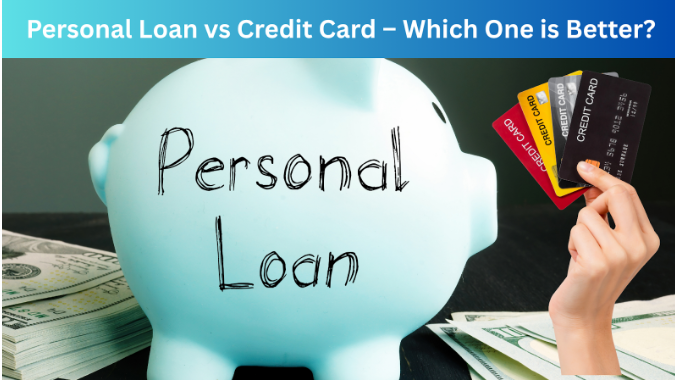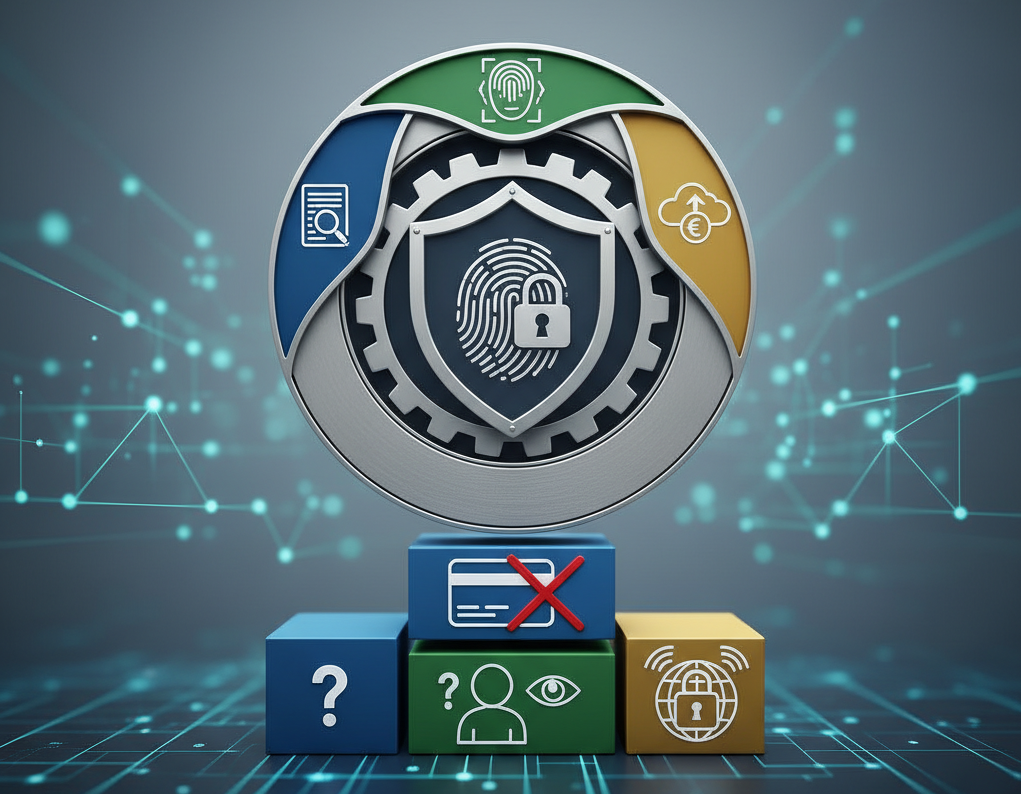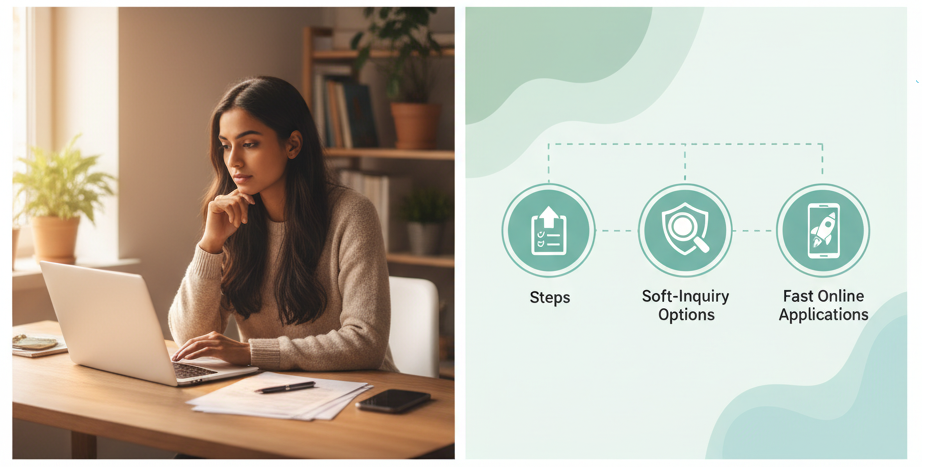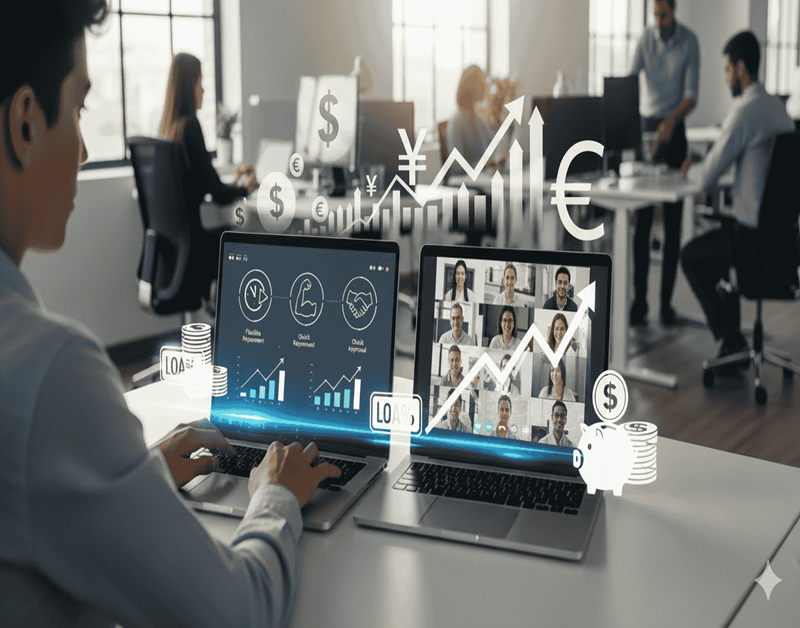Personal finance offers personal loans and credit cards as two simple ways to get quick cash. If you’re considering a trip, covering health costs, combining your debts or need money for an emergency, it can become important to decide between a personal loan and a credit card. How can you decide whether a personal loan vs credit card is better suited for you than another?
Being aware of the differences and advantages/disadvantages of each system helps you choose what’s best. In this thorough guide, we will study both personal loans and credit cards so you can pick the method that best supports your money goals.
Table of contents

What Is a Personal Loan?
A bank, credit union or online lender can give you a personal loan as an instalment loan. You receive a set amount of money and must repay it over a certain time. There will be the same monthly instalments each month. You can choose fixed or variable interest, and typically, loans are offered for a period of from 12 to 60 months.
Key Features of Personal Loans:
- Fixed loan amount and repayment period
- Predictable monthly payments
- Often lower interest rates than credit cards
- Can be spent for multiple purposes
What Is a Credit Card?
A credit card allows you to buy products and pay for services up to its limit. You can use your card, pay the amount and use it again whenever there is a need, but as long as you follow your credit limit. People most often use credit cards for their daily purchases because they are so convenient.
Key Features of Credit Cards:
- Revolving credit line
- Minimum monthly payments required
- Interest charged on outstanding balances
- Often come with rewards, cashback, or travel points
Personal Loan vs Credit Card: Key Differences
Interest Rates: The interest rate is a major difference you can find between personal loans and credit cards. Many times, people with good credit can get a loan with lower interest than they could find with other types. However, credit cards tend to have higher rates of interest which means you may end up paying much more if your balances aren’t cleared in full every month.
Repayment Terms: By getting a personal loan, you can see the total monthly payments as well as the number of payments you’ll make. This makes it easier to create a budget for managing your finances. Credit cards are different as you can just pay the lowest amount each month within the credit limit. Still, if spending isn’t kept under control, this flexibility can cause a person to carry debt for a long time.
Usage Flexibility: A Credit card provides you with flexibility that you can make a payment whenever you need it. After your card is approved, you are free to spend up to your credit limit on any purchase. Personal loans give you all the money at once, so it can be hard to handle regular expenses if they show up over time.
Loan or Credit Card for Debt Consolidation: A personal loan might be a better option when lowering the interest rate on debt is needed. It merges several debts into one and you may get charged a better interest rate. Nonetheless, there are also credit cards that let you transfer a balance at 0% interest for a promotional duration which can be helpful if you can pay off the debt in time.
Approval Process: Typically, personal loans must be approved after looking at your income and checking your credit scores. On the other hand, credit cards, especially with pre-approved offers, have a quick and easy application process.
When Should You Choose a Personal Loan?
The best decision for you depends on your budget and your future plans. A personal loan could be a better choice for the following scenarios:
- Debt Consolidation: Multiple credit card balances can be managed better with a personal loan as it can turn all your small loans into one lower-rate loan.
- Large Expenses: For major costs such as renovation, a wedding or medical needs, you can use a personal loan to arrange your payments.
- Fixed Repayment Schedule: If knowing the price of your repayments helps your budget, personal loans allow that.
When Should You Choose a Credit Card?
When you come across choices below, credit cards might be the better pick. Let’s discuss:
- Everyday Purchases: Using a credit card means handling your groceries, gas, meals and routine daily expenses is easier.
- Emergency Funds: With a credit card, you can get money quickly during unexpected emergencies.
- Reward Programs: Many banks provide cashback or miles that benefit you if you always clear your balance at the end of each month.
- Short-Term Financing: On short-term expenses that you’ll pay soon, using a 0% APR credit card can help you save money.
Pros and Cons of Personal Loans
Pros:
- Lower interest rates (for good credit)
- Fixed repayment schedule
- Can improve credit mix on your credit report
- Ideal for large, planned expenses
Cons:
- May require strong credit and income
- Some loans have origination fees
- Not reusable – you must apply again for new funds
Pros and Cons of Credit Cards
Pros:
- Ongoing access to credit
- Rewards and cashback programs
- Good for short-term or small purchases
- Can build credit with responsible use
Cons:
- High-interest rates
- Can lead to revolving debt
- Easy to overspend
- Minimum payments may extend debt for years
Personal Loan or a Credit Card: What Impacts Your Credit Score?
Both personal loans and credit cards can impact your credit score, but in different ways. A personal loan can help you to improve your credit score because it enables a variety of credit options. Whereas, credit cards can impact your utilization ratio. By keeping low balances and paying bills regularly, you can boost your score. Letting your credit card debt reach its maximum or not making payments can result in lowering your credit score.
Personal Loan vs Credit Card: Real-World Examples
Example 1: Debt Consolidation: Michael carries $10,000 in debt on three credit cards, all of which have an APR of 20%. He takes a personal loan for the same amount, agreeing to pay 10% APR over three years. John pays less in interest and knows exactly how to get rid of his debt.
Example 2: Emergency Medical Bill: Sarah’s medical bills come to $3,000. She uses a credit card with 0% APR for a whole year. The whole amount is paid off in just 10 months, meaning no interest is charged. It turned out to be smarter to use the credit card.
Conclusion: Choosing the Best Financing Option
Your decision about a loan or credit card will be driven by what you want to achieve and your habitual behavior. When you need a big loan with dependable payments, personal loans usually have lower rates and are structured. If you don’t want to be tied down, can use your funds easily and can repay the debt in time, a credit card could be your best pick. The right loan will be clear to you once you evaluate your spending, budget and goals. In any case, be cautious about borrowing and be sure to have a plan for paying back your debt to stay out of financial trouble.
Because everyone has different needs, there’s no perfect answer. But armed with the right details, you can decide wisely for your finances.
FAQs
Q. Is a personal loan better than a credit card for debt?
- If you are paying high rates on credit cards, a personal loan with a lower, regular interest rate is usually the best option for pulling your debt together.
Q. Can I use a personal loan like a credit card?
- It’s just one large single payment and you don’t get regular payments afterward. With a loan, you have to get a new one if the previous one has been paid off.
Q. Which is better for my credit score: personal loan or credit card?
- What impact they have on your credit depends on how well you manage them. Using a personal loan is good for your credit mix, compared to the effect credit card use has on how much available credit you are using.
Q. Should I get a loan or credit card for debt?
- It’s usually better to get a personal loan if your main aim is to reduce your average interest while paying lenders more quickly. However, a credit card with a 0% balance transfer offer could work if you repay it before the promotional period ends.


